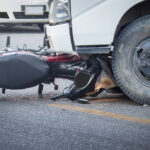- In accidents

Open Degloving And Closed Degloving Injuries
Open Degloving
Opened degloving, as discussed previously, occurs when the skin is torn from underlying connective tissues, muscle, or bone. The blood supply is lost due to damage to tissues containing blood vessels. It is titled “open” because the wound is open, meaning that the structural components of the body are exposed. Open degloving injuries typically present with extreme blood loss.
Closed Degloving
Alternatively, closed degloving (also known as Morel-Lavallee lesion) occurs when the skin is separated from the underlying connective tissues or structural components but is still intact. There is no open wound with closed degloving, and external bleeding does not typically occur.
The separation of the skin from connective tissues creates a space where blood, lymphatic fluid, and fat can gather. These spaces become a breeding ground for infection. Additionally, if the blood supply is not reconnected at the damaged area, limbs or extremities can die and become necrotic. A dead limb requires amputation.
Closed degloving most commonly occurs in the hip bone area but also commonly occurs in the torso, buttocks, lower spine, shoulder blades, and knees. Closed degloving injuries are commonly caused by similar accidents as open degloving injuries. Furthermore, blunt high-force impact to the skin can cause closed degloving. A car accident is an example of a common cause of closed degloving injuries.
Because closed degloving is not as readily apparent as open degloving, it can be more difficult to diagnose; however, diagnoses are usually made using MRI imaging to discern whether the skin has detached from the supporting layers.
In severe cases, closed degloving injuries often require the same treatment as open degloving injuries. These treatments include:
- Surgical removal of any infected or necrotic tissues
- This may come as amputation
- Reattachment of degloving skin
- Skin grafts or skin flaps to restore the area
- Treatment of traumatic injuries in the same area (such as broken bones)
- Extensive physical therapy after the affected area is recovering
Alternatively, minor closed degloving injuries can be treated with compression bandages, drainage of any building fluid, and close monitoring.
Degloving Claims
As with open degloving injuries, closed degloving injuries may also require extensive physical therapy and surgical treatment. An arduous recovery process with heavy medical intervention also leads to expensive medical bills, extended time away from work, and general pain and suffering. As closed degloving injuries can be as severe as their open counterparts, recovering damages for such injuries in a personal injury claim may look very similar.
If you or a loved one have experienced either form of degloving injury due to an accident, you should reach out to a personal injury attorney for a free consultation. At the very least, a skilled attorney can help guide you through your rights and the legal ramifications for any involved in the accident.
For example, both forms of degloving injuries are commonly caused by workplace accidents. Ordinarily, individuals injured in the workplace are limited in their rights to sue an employer. However, in some cases, employer negligence can lead to a claim for personal injury. Law Offices of Samer Habbas & Associates can give you a deeper understanding of your rights and who may be responsible for your extraordinary injuries.
Contact A Personal Injury Attorney
Law Offices of Samer Habbas & Associates has the experience and expertise to solve problems for clients and achieve the best possible results. For more information or to schedule a complimentary consultation, please call 888-848-5084 or contact us online.
Recent Post
-
April 15, 2024
-
April 12, 2024
-
April 9, 2024
-
April 8, 2024
-
April 8, 2024









